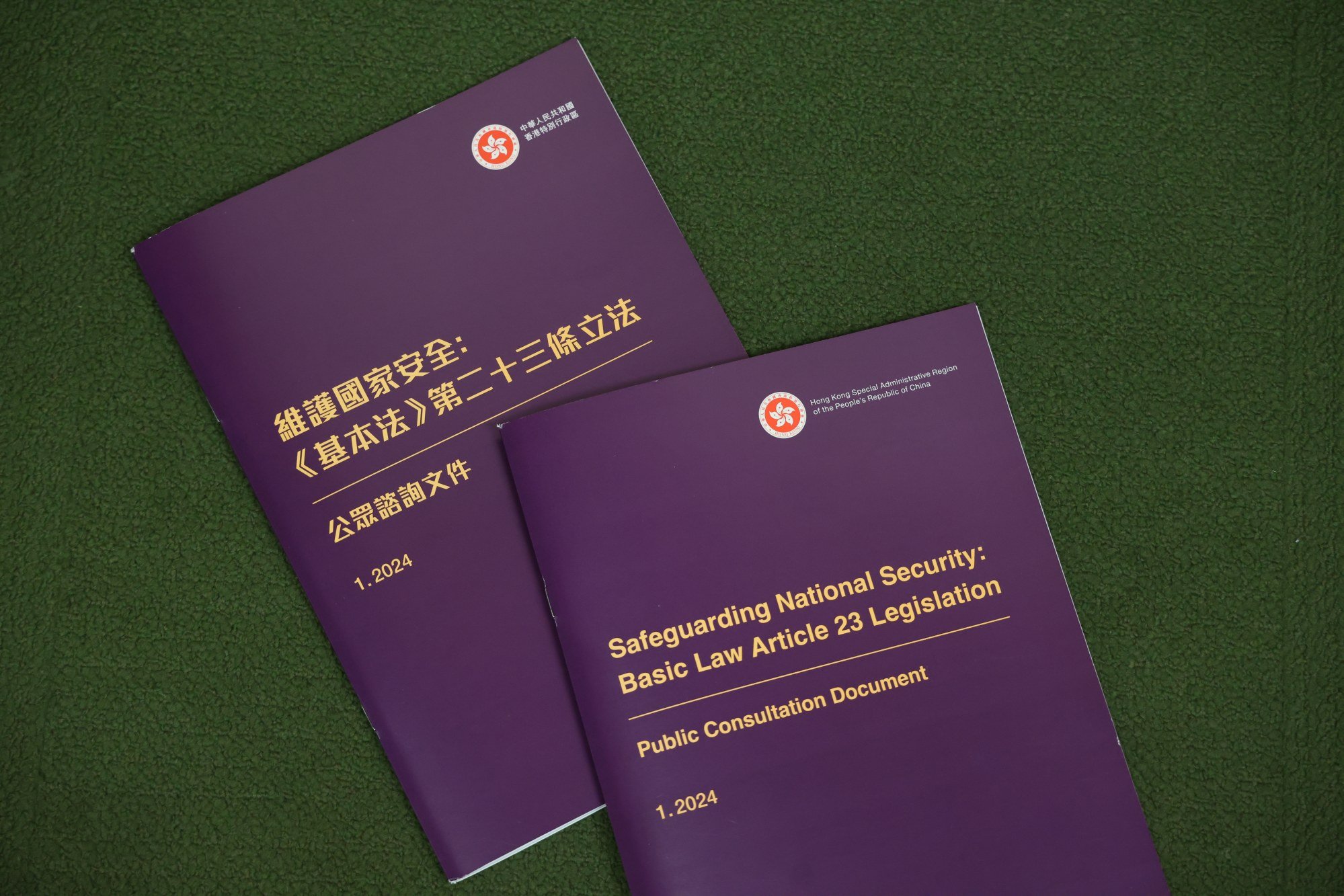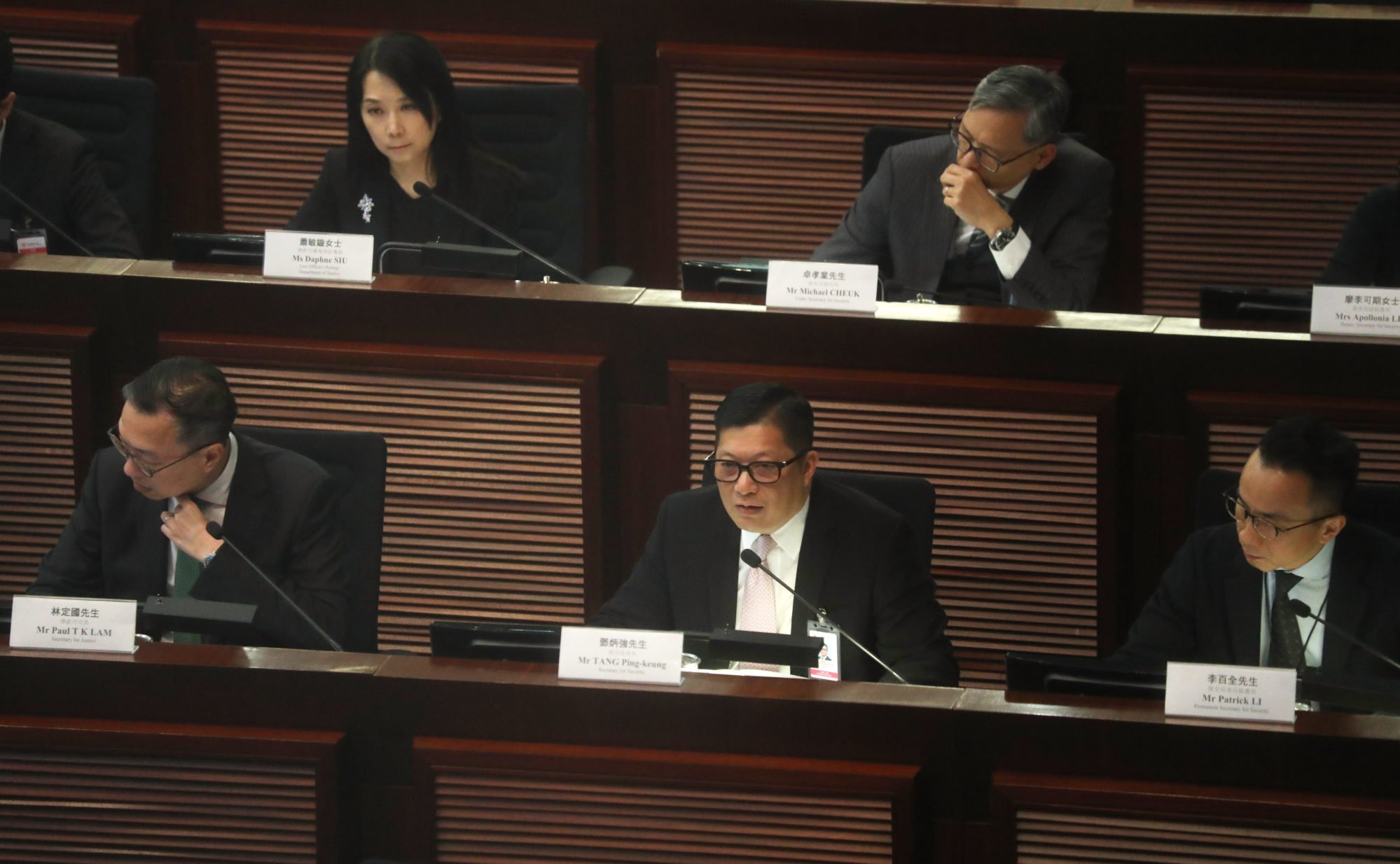
Hong Kong authorities propose public interest defence, tougher penalties for collusion with external forces under Article 23 national security law
- Minister briefs lawmakers on submissions received during one-month consultation exercise for proposed legislation
- Post learns special Executive Council meeting to be held on Thursday or Friday to endorse bill before it is published in gazette
Security minister Chris Tang Ping-keung also told the Legislative Council on Wednesday that the government was considering measures to deter suspects from fleeing the city upon release from arrest, including confiscating their passports and deregistering their businesses.
The Post has learned that a special meeting of the key decision-making Executive Council will be held on Thursday or Friday to endorse the bill before it is published in the gazette. The government plans to introduce it to the legislature next Wednesday for the first reading.
“The authorities are aiming to enact it by mid-April,” a source familiar with the plan said, adding that executive councillors attending the “two sessions”, the key political meetings in Beijing, were told to cut short their stay in the capital and return to Hong Kong for the coming meeting.
Security chief Tang was speaking at a special joint panel meeting of lawmakers after authorities presented a document summarising the more than 13,000 comments gathered during the one-month consultation period on the proposed legislation that ended last week.

Most of the feedback focused on taking part in military drills without authorisation, sedition, theft of state secrets, espionage and foreign interference.
The paper highlighted four suggestions that authorities “would take into account” and adopt “if appropriate”, including higher penalties for certain security offences when collusion with external forces was involved in the conduct, compared with offences with no external forces involved.
For example, such tougher penalties might apply to those convicted of inciting disaffection of public officers, the unlawful acquisition and possession of state secrets by a public officer, the unlawful disclosure of confidential information and sabotage that endangers national security.
Authorities also confirmed they were considering a “public interest defence” for offences related to state secrets, as suggested by legal bodies and journalist groups.
Secretary for Justice Paul Lam Ting-kwok stressed the need to strike a balance between safeguarding the country and protecting other public interests as the national security risks could vary by case, after lawmaker Stanley Ng Chau-pei, who is also a member of the Executive Council, cast doubt on the need for a public interest defence.
“In principle, nothing is above safeguarding national security,” Lam said. “This cannot be wrong and must be the truth. However, we must distinguish that in individual cases, the [extent of] national security risks arising from the disclosure of state secrets may differ from case to case, because it depends on the nature of the state secret, like whether it is about military or economic matters, and what the content is.”
The government said it would consider adding clauses similar to the “safeguarding of information” under the current Official Secrets Ordinance for related offences. It would also weigh the use of unmanned tools, such as drones, for spying.
Authorities agreed to consider prescribing measures to address the absconding of arrestees, as well as to encourage fugitives to return. According to the government’s suggestion, when a person is charged with an offence endangering national security and has absconded for more than six months, the security secretary might impose measures targeting the individual.

Examples given in the summary included prohibiting a person from making any funds available to an absconder or dealing with that money.
“Could we terminate the person’s professional qualifications?” Tang said in the meeting. “For some registrations, such as business registrations, can we cancel them and make [the person] pay some price for absconding? We will actively consider these ideas we’ve heard.”
The government would also consider tightening the threshold for jailed offenders to obtain early release and provide exemptions for residents who have emigrated and are required to perform military service according to the local laws of their new host country. Tang told lawmakers that those who took part in such drills overseas “solely for entertainment” would be exempted from potential prosecution.
In their published submissions to the consultation exercise, foreign business chambers and professional groups called for clearer definitions and a narrower scope of the offences, especially in relation to the criteria and conduct for crimes involving state secrets and foreign interference.
Justice minister Lam pledged the legislation would present the terms as clearly as possible to precisely target conduct that put national security at risk, but he also maintained the bill must be drafted to completeness to properly serve its purpose.
While the document provided a summary of the feedback, not all concerns were addressed by authorities. The government for instance rejected the Bar Association’s suggestion to include inciting violence as a requirement for all acts of seditious intention. The government argued that incitement to hate authorities might snowball over time to trigger large-scale riots and the legislation “must be able to prohibit related behaviours”.
According to authorities, 98.6 per cent of the 13,489 submissions it received during the consultation exercise were in support of the proposal.
Lam added that authorities would remain open to public feedback even after the bill was submitted to the legislature. He said the drafting was under way but provided no exact date for its submission to lawmakers.


